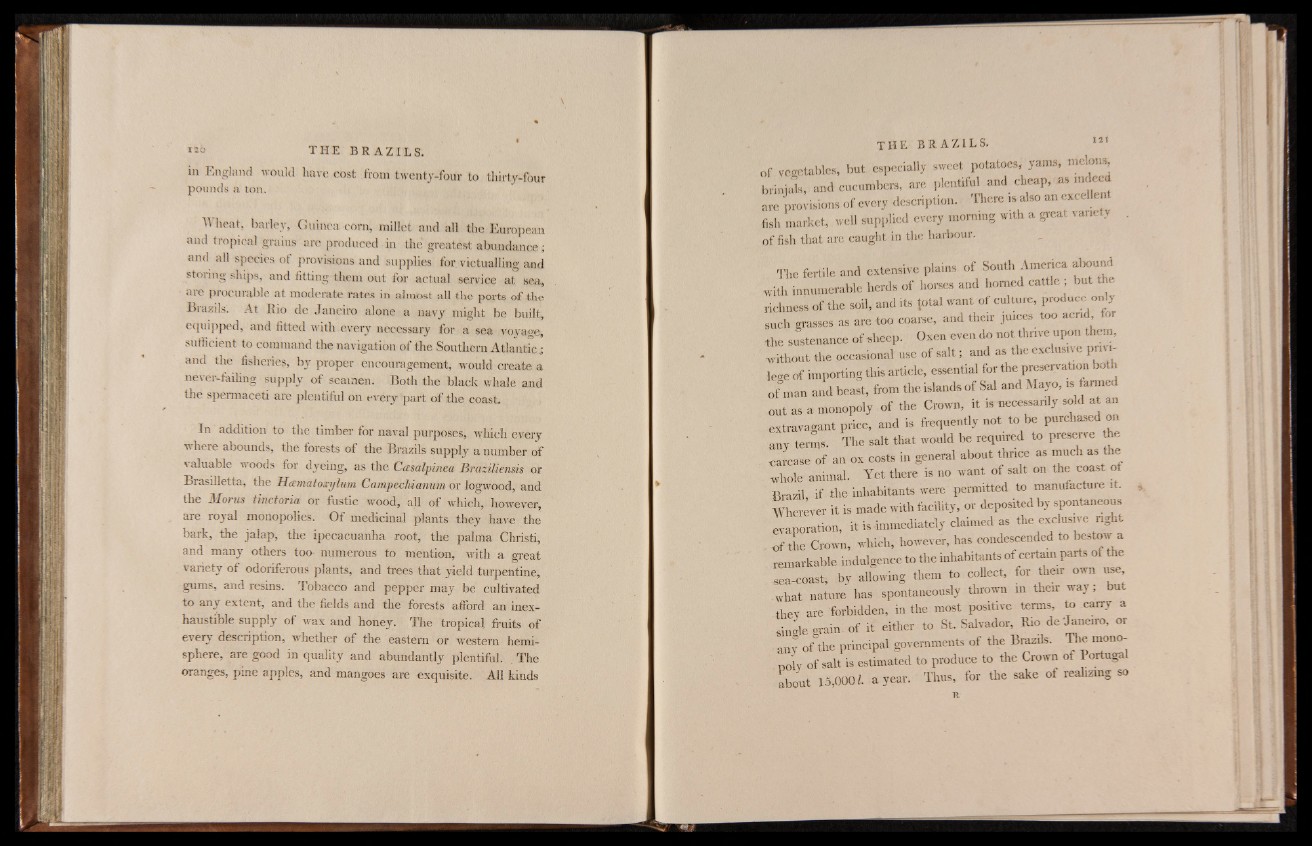
in England would have cost from twenty-four to thirty-four
pounds a ton.
"Wheat, barley, Guinea corn, millet and all the European
and tropical grains are produced in the greatest abundance;
and all species of provisions and supplies for. victualling and
storing ships, and fitting them out for actual service at sea,
are procurable at moderate rates in almost all the ports of the
Brazils. At Rio de Janeiro alone a navy might be built,
equipped, and fitted with every necessary for a sea voyage,
sufficient to command the navigation of the Southern Atlantic;
and the fisheries, by proper encouragement, would create a
never-failing supply of seamen. Both the black whale and
the spermaceti are plentiful on every part of the coast
In addition to the timber for naval purposes, which every
where abounds, the forests of the Brazils supply a number of
valuable woods for dyeing, as the Casalpinea Braziliensis or
Brasilletta, the Heematoxylum Campecliianum or logwood, and
the Morus tmctaritt or fustic wood, all of which, however,
are royal monopolies. Of medicinal plants they have the
bark, the jalap, the ipecacuanha root, the palma Christi,
and many others too numerous to mention, with a great
variety of odoriferous plants, and trees that yield turpentine,
gums, and resins. Tobacco and pepper may be cultivated
to any extent, and the fields and the forests afford an inexhaustible
supply of wax and honey. The tropical fruits of
every description, whether of the eastern or western hemisphere,
are good in quality and abundantly plentiful. The
oranges, pine apples, and mangoes are exquisite. All kinds
of vegetables, but especially sweet potatoes, yams, melons
brinjals, and cucumbers, are plentiful and cheap, as indeed
a r e provisions of every description. There is also a n excellent
fish market, well supplied every morning with a great variety
of fish that arc caught in the harbour.
The fertile and extensive plains of South America abound
with innumerable herds of horses and homed cattle ; but th
richness of the soil, and its total want of culture, produce only
such grasses as are too coarse, and their juices too acrid for
the sustenance of sheep. Oxen even do not thrive upon them,
without the occasional use of salt; and as the cxc usne pm 1
W e of importing this article, essential for the preservation both
ofman and beast, from the islands of Sal and Mayo, is fanned
out as a monopoly of the Crown, it is necessarily sold at an
e x t r a v a g a n t price, and is frequently not to be purchased on
any terms. The salt that would be required to preserve the
carcase of an ox costs in general about thrice as much as the
whole animal. Yet there is no want of salt on the coast
Brazil if the inhabitants were permitted to manufacture it.
Wherever it is made with facility, or deposited by spontaneous
evaporation, i t i s immediately claimed as the exclusive nght
. 0f the Crown, which, however, has condescended to bestow a
remarkable indulgence to the inhabitants of certain parts of the
sea-coast, by allowing them to collect, for their own use
what nature has spontaneously thrown m their way; but
they are forbidden, in the most positive terms, to carry a Ilf# grain of it either to St. Salvador, Rio deJanerro, or
any of the principal governments of the Brazils. The monopoly
of salt is estimated to produce to the Crown of Portuga
about 15,0001- a year. Thus, for the sake of realizing so
n